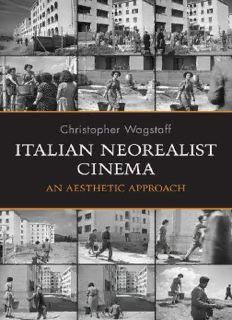
Italian Neorealist Cinema: An Aesthetic Approach PDF
Preview Italian Neorealist Cinema: An Aesthetic Approach
ITALIAN NEOREALIST CINEMA: AN AESTHETIC APPROACH The end of the Second World War saw the emergence in Italy of the neo- realism movement, which produced a number of films characterized by stories set among the poor and working class, often shot on location using non-professional actors. In this study Christopher Wagstaff pro- vides an in-depth analysis of neorealist film, focusing on three films that have had a major impact on filmmakers and audiences around the world: Roberto Rossellini’s Roma città aperta and Paisà and Vittorio De Sica’s Ladri di biciclette. Indeed, these films are still, more than half a century after they were made, among the most highly regarded works in the history of cinema. In this ambitious, carefully researched study, Wagstaff takes an innovative alternative approach to the analysis of these films, treating them primarily as aesthetic artefacts rather than as accurate representations of historical reality. The author begins by situating neorealist cinema in its historical, industrial, commercial, and cultural context. He goes on to provide a theoretical discussion of realism and the merits of neorealist films, indi- vidually and collectively, as aesthetic artefacts. The core of the book is devoted to a detailed analysis of the three films, concentrating on tech- nical and production aspects as well as on the broader significance of the films as cinematic works of art. While providing a wealth of information and analysis previously un- available to an English-speaking audience, Italian Neorealist Cinema of- fers a radically new perspective on neorealist cinema and the Italian art cinema that followed it. (Toronto Italian Studies) christopher wagstaff is Senior Lecturer in Italian Studies at the Uni- versity of Reading. This page intentionally left blank CHRISTOPHER WAGSTAFF Italian Neorealist Cinema An Aesthetic Approach UNIVERSITY OF TORONTO PRESS Toronto Buffalo London www.utppublishing.com © University of Toronto Press Incorporated 2007 Toronto Buffalo London Printed in Canada ISBN 978-0-8020-9761-3 (cloth) ISBN 978-0-8020-9520-6 (paper) Printed on acid-free paper Toronto Italian Studies Library and Archives Canada Cataloguing in Publication Wagstaff, Christopher, 1946– Italian neorealist cinema : an aesthetic approach / Christopher Wagstaff. (Toronto Italian studies) Includes bibliographical references and index. ISBN 978-0-8020-9761-3 (bound). – ISBN 978-0-8020-9520-6 (pbk.) 1. Motion pictures – Italy – Aesthetics. 2. Rosellini, Roberto, 1906–1977 – Criticism and interpretation. 3. De Sica, Vittorio, 1901–1974 – Criticism and interpretation. 4. Motion pictures – Italy – History. I. Title. II. Series. PN1993.5.I88W34 2007 791.430945 C2007-904288-0 Publication of this book was made possible by grants from The Leverhulme Trust, the Arts and Humanities Research Board, and the Department of Italian Studies of the University of Reading. University of Toronto Press acknowledges the financial assistance to its publishing program of the Canada Council for the Arts and the Ontario Arts Council. University of Toronto Press acknowledges the financial support for its publishing activities of the overnment of Canada through the Book Publishing Industry Development Program (BPIDP). In loving memory of Gabriella Verrucchi This page intentionally left blank Contents Acknowledgments ix Introduction 3 1 Overview 7 The Italian Cinema Industry 7 The Cultural Context 20 Films: Production and Screenwriting 26 The Pro-filmic 30 The Institution of Neorealism 37 2 Realism 41 Aesthetics 41 Reference 48 Narrative 54 Genre 59 Idealism 65 Realism 71 Cesare Zavattini 78 Rhetoric 82 A Note on Comedy 92 3 Roma città aperta 94 Photography 94 Lighting 100 Sound 105 Mise en scène 107 Performers 119 viii Contents Costume 127 The Narrative: Story and Plot 136 Dramaturgy: Analysis of the Episode of the Shooting of Pina 163 Roma città aperta and Neorealism 181 4 Paisà 185 The Rome Episode 192 The Sicily Episode 201 The Monastery Episode 216 The Naples Episode 240 The Florence Episode 253 The Po delta Episode 263 Concluding Remarks on Paisà 287 5 Ladri di biciclette 291 Locations 307 Performers and Costume 313 Narrative 321 Analysis of Sequences 325 Concluding Remarks 396 Concluding Remarks 402 Appendices 407 1 A standard introduction to neorealism 409 2 Historical background for neorealism 414 3 Statistics of the Italian film industry 417 4 Categories of cinema in Italy, 1953 419 5 Number of tickets sold at cinema box offices in provincial capitals and in the rest of the provinces, 1947–1955 420 6 Length (in days) of opening runs in cinemas in major Italian cities of neorealist films and Catene 421 7 Statistics of days of cinema showing, tickets sold, and box-office receipts in Italy, 1936–1960 422 8 Established film production companies in Italy, 1945–1953 423 9 Italian film production, 1945–1953 425 10 Directors of neorealist films, 1945–1953 426 11 Writers of neorealist films, 1945–1953 427 12 Directors of photography on neorealist films 429 Contents ix 13 Production arrangements and costs for five core neorealist films 430 14 Italian public’s reception of different categories of Italian films produced 1945–1953, and subsequently released 1945–1956 431 15 Fifty-five ‘neorealist’ films 435 16 Filmographic details of Roma città aperta, Paisà, and Ladri di biciclette 440 17 Average shot length, pre-neorealism and neorealism 444 18 Average shot length, neorealist films 445 19 Average shot length, neorealist films of De Sica, Rossellini, Visconti, Antonioni 446 20 Scale (closeness) of shot comparison, Roma città aperta and other films (1) 447 21 Scale of shot comparison, Roma città aperta and other films (2) 448 22 Scale of shot comparison, Roma città aperta and other films (3) 449 23 Map of settings and locations for Paisà 450 24 Average shot length for different sections of Paisà 451 25 Scale of shot, Paisà – Po delta episode 452 26 Tammurriata nera 453 27 Map of locations for Ladri di biciclette 454 Notes 457 Bibliography 473 Index 493 Plates 1–33, stills from Ladri di biciclette, follow page 348.
Description: